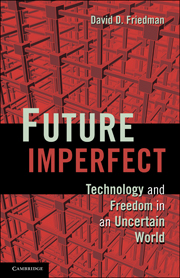Book contents
13 - Human Reproduction
Published online by Cambridge University Press: 18 August 2009
Summary
Through most of the past century, improved reproductive technology has consisted in large part of better ways of not reproducing. Better contraception has been accompanied by striking changes in human mating patterns: a steep decline in traditional marriage, a corresponding increase in nonmarital sex, and, perhaps surprisingly, extraordinarily high rates of childbirth outside of marriage. While the long-term consequences of reliable contraception will continue to play out over the next few decades, they will not be discussed here. This chapter deals with more recent developments in the technology of human reproduction.
BUILDING BETTER BABIES
Eugenics, the idea of improving the human species by selective breeding, was supported by quite a lot of people in the late nineteenth and early twentieth centuries. Currently it ranks, in the rhetoric of controversy, only a little above Nazism. Almost any reproductive technology capable of benefiting future generations is at risk of being attacked as “eugenics” by its opponents.
That argument confuses, sometimes deliberately, two quite different ways of achieving similar objectives. One is to treat human beings like show dogs or racehorses – have someone, presumably the state, decide which ones get to reproduce in order to improve the breed. Such a policy involves forcing people who want to have children not to do so and perhaps forcing people who do not want to have children to do so.
- Type
- Chapter
- Information
- Future ImperfectTechnology and Freedom in an Uncertain World, pp. 189 - 201Publisher: Cambridge University PressPrint publication year: 2008



